Archive
13 April 2023
KIC grant awarded to sustainable surgery robot for minimally invasive surgery
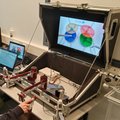
NWO has awarded six research projects in the KIC call ‘Key enabling technologies for minimally invasive interventions in healthcare’, including the research of Tim Horeman, Assistant Professor of Sustainable Surgery & Translational Technology at the Department of Biomechanical Engineering.
10 May 2022
Kamel Hooman appointed Professor of Heat Transformation Technology
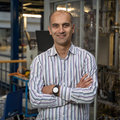
Kamel Hooman has been appointed Professor of Heat Transformation Technology at the Process & Energy Department of the 3mE Faculty starting on April 1, 2022. He has broad expertise in the field of fluid mechanics and heat transfer.
09 March 2021
Liselore Tissen: new ‘Face of Science’
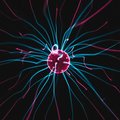
Today, the Royal Netherlands Academy of Arts and Sciences (KNAW) announced the twelve new ‘Faces of Science’. Liselore Tissen, PhD student at the department of Materials Science and Engineering and part-time at Leiden University, is one of the 12 new faces.
02 February 2023
Lorenzo Botto has been awarded an ERC Proof of Concept grant
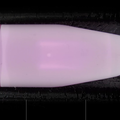
His research is based on a previous ERC grant on graphene nanoparticles, in which centrifugation was used to sort particles by size classes.
18 December 2018
Lunch Lecture e-Refinery
07 October 2021
Making surgical instruments from medical waste
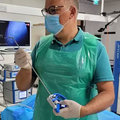
In Dutch hospitals, over a million kilos of blue ‘wrapping paper’ is used each year to keep medical instruments sterile. After they have been used, they create an enormous mountain of waste. Researchers Tim Horeman and Bart van Straten devised a method to melt down this blue polypropylene wrapping paper and turn it into a new medical device.
11 October 2023
Making the invisible visible: Micro CT scanner offers 3mE new research opportunities
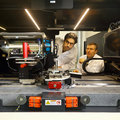
Recently, researchers have been able to dive even deeper into materials. The arrival of a micro CT scanner at the faculty allows researchers to explore the invisible world.
06 July 2023
Marjon Stijntjes voted best 3mE educator 2022-2023
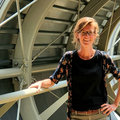
They praised her for the clear structure of her teaching and innovative teaching methods. Among other things, Stijntjes develops and teaches the course Extramural Sensing and Virtual Stimulation as part of the master’s programme in Technical Medicine.
01 November 2019
Materials experts join the corrosion community in China
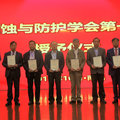
Arjan Mol, professor of Corrosion Technology and Electrochemistry, and Herman Terryn, part-time lecturer at the Department of Materials Science and Engineering, were the first international corrosion scientists to receive a Fellowship Award from the Chinese Society for Corrosion and Protection (CSCP) this month. The fellowship serves to highlight the potential of exchanging fundamental knowledge across continents and further reinforce collaboration with China.
03 June 2021
Materials scientists join forces to fight corrosion

Finding new ways of protecting metal surfaces against corrosion: that is the aim of corrosion researchers Peyman Taheri, Yaiza Gonzalez-Garcia and professor Arjan Mol from the Department of Materials Science and Engineering. They are joining forces with 11 partners from 7 different countries to accelerate the sustainable development and production of corrosion protection technologies.
14 January 2019
Materials scientists unveil Rembrandt’s 3D technique

An international team of researchers, led by the Department of Materials Science and Engineering and the Rijksmuseum, have discovered how Rembrandt created a ‘3D effect’ in his paintings.
20 January 2022
Matin Jafarian and Ajay Seth have been awarded a NWO Open Competition Grant

Matin Jafarian, researcher of Delft Center for Systems and Control and Ajay Seth, researcher at BioMechanical Engineering, have been awarded the NWO Open Competition Grant for their unique research.
16 June 2022
Mechanical Engineering students create design for energy extraction and storage from waves
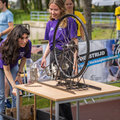
By 2050, the energy supply in the Netherlands will have to be almost entirely sustainable. In addition to energy extraction from natural sources, energy storage is still a major challenge. Is there a technical solution for simultaneous extraction and storage? More than 500 first-year students from TU Delft’s Mechanical Engineering programme worked for six months on a wave energy accumulator, which converts the energy from the movement of waves into the rotational energy of a flywheel. The design that performed best technically was given an award during the Design Competition on 9 June 2022.
01 July 2021
Mechanical Engineering students design solution for high-altitude assembly
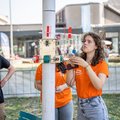
Almost 600 first-year mechanical engineering students at TU Delft spent six months working on the best possible design for a ‘Climbing Stacker’, which could help to assemble increasingly large wind turbines in a more efficient way, for example. The design that performed best technically received an award during the design competition on 16 June 2021.
02 July 2020
Mechanical engineering students design inventive pack dog
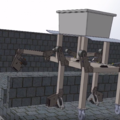
Parcel deliverers are faced with a challenge - partly due to the corona crisis - to deliver more and heavier parcels to people's homes. Our first-year students have a solution for this.
20 June 2023
Mechanical engineering students display their Precision Disc Thrower
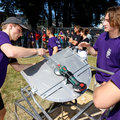
Designing a precision disc thrower is an ambitious challenge. ‘A lot goes into this kind of mechanical design. It has to have sufficient power, speed and precision. The rotation of the disc around its own axis – known as the gyroscopic effect – is also important,’ says Regine Vroom, coordinator of the design project.
14 April 2020
Mechanical ventilator from the 1960s inspires Delft engineers
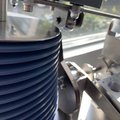
Today, a team of Delft researchers and students from the BioMechanical Engineering department is launching a new type of ventilator that is purely mechanical and which you could easily construct and repair yourself. The team borrowed a 1960s ventilator from Rijksmuseum Boerhaave and used it as inspiration. As it works mechanically, no electronics are required. This is particularly advantageous since its production is not dependent on the – now uncertain – supply of parts from China.
28 April 2020
Mechanical ventilator to Guatemala
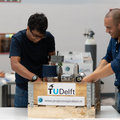
The researchers of Project Inspiration have made all of the designs for their mechanical ventilator available worldwide. In this way, the team hope to reduce the shortage of ventilators in the Netherlands and abroad. In addition, a test model has been prepared, and it will soon be sent to Guatemala.
02 June 2020
Mexico receives prototype of mechanical ventilator developed by TU Delft
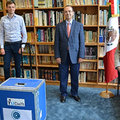
The Embassy of Mexico in the Netherlands received the prototype of a mechanical ventilator developed by Delft University of Technology (TU Delft) within the framework of its Project Inspiration. The prototype will be lent to the government of Mexico to support its efforts in the fight against the COVID-19 pandemic.
15 July 2019
Michaël Wiertlewski awarded best paper IEEE Transactions on Haptics 2019
04 June 2020
Micro-pipette probe for tuning the volume and particle concentration of liquids
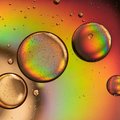
At the PME department, a micro-sized pipette probe has been developed for handling multiple liquids. It is the first time that such a small probe can dose fluid volume, and simultaneously control the concentration of particles inside the fluid.
04 December 2019
Microchip for room temperature quantum internet
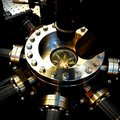
A key requirement for a future quantum internet is that it will be widely accessible and affordable. This requires the ability to prepare mechanical systems in their lowest possible energy state (the quantum ground state) without expensive cryogenics.
08 December 2020
Miguel Bessa and Richard Norte have been awarded the Interstellar Initiatives Grant

Miguel Bessa and Richard Norte have been awarded an Interstellar Initiatives Grant from the Limitless Space Institute. The award is for their research ‘Origami Photonic Crystal Sails with Machine Learning’. Their research focus is about the development and demonstration of nanoscale origami photonic crystal membranes using data-driven machine learning.
12 December 2019
Millions for large-scale energy storage research
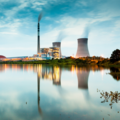
Paulien Herder, professor in Energy Systems at Delft University of Technology (TU Delft), and her team in the interdisciplinary consortium RELEASE (Reversible Large-scale Energy Storage) have received funding from the Dutch Research Council (NWO) totalling over € 10 million for research into large-scale energy storage. NWO is investing € 39 million in five large, interdisciplinary research consortia within the Crossover programme, with the aim of helping to meet various social and economic challenges.
21 February 2020
Millions of euros to improve the Rhine-Alpine freight corridor
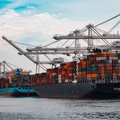
The European Commission has granted almost 9 million euros to the Horizon 2020 research programme ‘Novel inland waterway transport concepts for moving freight effectively’ (NOVIMOVE).
16 March 2020
Millions of euros to improve to improve the Rhine-Alpine freight corridor

Container ships that aren’t fully loaded, congested locks resulting in long waits for vessels, suboptimal navigation of ships on rivers and fully loaded ships that cannot cope with low water levels. These are common problems on inland waterways. The Horizon 2020 programme ‘Novel inland waterway transport concepts for moving freight effectively’ (NOVIMOVE) is going to use a European grant of almost 9 million euros to conduct research on how to improve the logistics of this transport system.
25 September 2023
Modelling of adhesive technology sheds new light on prehistoric cognition
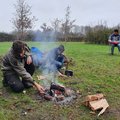
Studying prehistoric production processes of birch bark tar using computational modelling reveals what kinds of cognition were required for the materials produced by Neanderthal and early modern humans.
02 February 2023
Mohammad Khosravi has been granted the Swiss Federal Institute of Technology medal
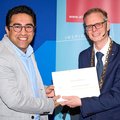
Mohammad Khosravi has been granted the ETH (Swiss Federal Institute of Technology in Zürich) medal for his doctoral thesis titled "Side-Information in Linear and Nonlinear System Identification".
12 November 2020
More efficient conversion of heat into electricity by tinkering with nanostructure

Researchers TU Delft have not only been able to explain how nano-structures in thermoelectric materials can improve energy efficiency but they also propose a commercially more attractive way to manufacture nano-structured thermoelectric materials, increasing the chances for mass-production of thermoelectric energy. Their results were published in Nano Energy.
18 April 2019
More than a million for research on electrified bubbles
An NWO TA (Technology Area) grant of more than a million euros has been awarded to a team of researchers to investigate the formation of hydrogen bubbles, the transport of chemical species near the bubbles and the electrodes, and the interaction between bubbles. Large scale production of hydrogen is possible by electrochemically splitting water into hydrogen and oxygen. The flow and transport processes near electrodes is poorly understood, in particular around the produced hydrogen bubbles. A better understanding can help to increase the efficiency.
30 November 2021
Mud research requires multidisciplinary approach
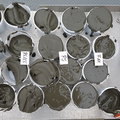
Mudnet, the Delft-based multidisciplinary team consisting of marine and civil engineers researching the properties of mud, won the NWO ‘Team Science Award’ this week. The team was praised for using a great diversity of expertise in subject.
05 December 2018
NIH Grants awarded to research team Raf Van de Plas
The National Institutes of Health (NIH) are awarding two prestigious American grants to the research team led by Raf Van de Plas from the Department of DCSC.
02 February 2022
NWO KICKstart grant for cross-border projects working on the electrification of the industry

Three promising cross-border collaborative projects of the TU Delft consortium e-Refinery have been granted the electrochemical conversion and materials (ECCM) KICkstart grant by NWO (Dutch Research Council).
07 April 2020
NWO LIFT grant for Remco Hartkamp and Burak Eral

NWO has awarded researchers Remco Hartkamp and Burak Eral from the Department of Process & Energy a LIFT (Launchpad for Innovative Technology) grant for their research on selectively extracting ionic contaminants from water with the aid of porous electrodes via a process called capacitive deionization. The aim of the research is to develop a solution for selectively removing ionic contaminants in water.
19 October 2021
NWO Open Competition Grant for Hanieh Bazyar
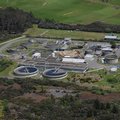
Current membrane fabrication processes are not sustainable because they are energy-intensive and require hazardous solvents. We are all familiar with the concept of 3D printing as it has been used in various fields in the last decades. However, it couldn’t find its contribution yet to the big industry of polymeric membrane production. Hanieh Bazyar, Department of Process and Energy, received NWO Open Competition Grant for her research on next generation 3D printed separation membranes.
15 November 2021
NWO Open Competition Grant for Sabina Caneva

In her research project ‘MechanoPore’ Sabina Caneva works on the development of programmable, shape-shifting DNA origami nanovalves for size-selective delivery of biomolecules across cell membranes. The NWO Domain Board Science has awarded Caneva for her research in the Open Competition Domain Science-XS.
30 May 2022
NWO Perspectief Award for Project using Ammonia as Fuel for Heavy Transport
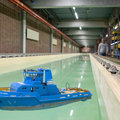
The world badly needs alternatives to fossil fuels that produce large amounts of carbon dioxide, which drive global climate change. One promising alternative is ammonia, which by combining Fuel Cell and Internal Combustion Engine technologies could be used to fuel large ships and heavy road transport.
23 August 2018
NWO START-UP grant for Carlas Smith
24 May 2022
NWO XS Grants awarded to P&E research on Smart Membranes and Lithium Batteries

Two NWO-XS grants of up to € 50,000 have been awarded by the Dutch Research Council to Professor Thijs Vlugt and to Dr Hanieh Bazyar: Vlugt for his research on safe and efficient recycling Lithium-ion batteries, and Bazyar for her work on developing smart membranes used in waste-water treatment.
30 January 2023
NWO-xs grant for new ‘Green’ way to produce Ammonia

The Dutch Research Council (NWO) has awarded Mahinder Ramdin (P&E) an NWO-xs grant for his ‘Green Ammonia Production’ project, GAPLiC. Ammonia is important in the production of fertiliser, and therefore mass food production, but the current ammonia production process consumes enormous amounts of energy - 1% of all the energy produced globally.